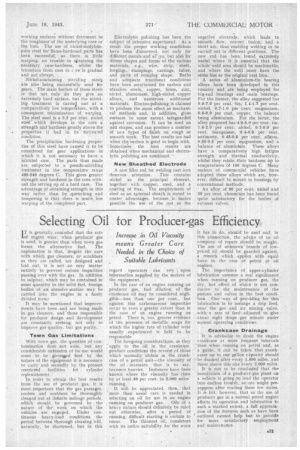Selecting Oil for Producer-gas Efficiency
Page 33

If you've noticed an error in this article please click here to report it so we can fix it.
Increase in Oil Viscosity means Greater Care Needed. in the Choke of Suitable Lubricants
IT is generally, conceded that the rate lof engine wear, when producer gas is used, is greater than when town gas forms the alternative fuel. The explanation is that, despite the care with which gas cleaners, or scrubbers as they are called, are designed and laid out, it is not an easy matter entirely to prevent certain impurities passing over with the gas. In addition to sulphur, which may be contained in some quantity in the solid fuel, foreign bodies of an abrasive mature may be carried into the engine in a finely divided forms It may be mentioned that improvements have been-and are being made in gas cleaners, and 'those responsible for producer design and development are constantly seeking, not only to improve gas quality, but gas purity.
Town Gas Limitations
With town gas, the question of contamination does not arise, but any considerable extension of its use would seem to be goverdaed first by the nature of the equipment it is necessary to carry and secondly by the present restricted facilities cylinder replenishment.
In order to obtain the best results from the use of producer gas, it is most important that the gas passages, coolers and Kuhl:lets be thoronghly cleaned out at definite mileage periods, which should be governed by the nature of the work on which the vehicles are engaged. Under continuous heavy-load conditions the period between thorough cleaning wilt, naturally, be shortened,. but in this
regard operators can rely , upon information supplied by the makers of the equipment.
In the case of an engine running on producer gas, fuel dilution of the crankcase oil may be considered negligible—less than one per cent., but against this carbonaceous impurities occur to even a greater extent than in the case of an engine running on petrol. There is, too, greater evidence of the presence of metallic soaps for which the higher rate of cylinder wear usually experienced is held to be responsible
The foregoing considerations, as they apply to the oil in the crankcase, produee conditions the reverse of those which normally obtain in the crankcase of a petrol unit—the viscosity of the oil increases, that is to say, becomes heavier. Instances have been known where the viscosity has risen
by at least 50 per cent. in 2000, miles running, It will be appreciated, then, that more than usual care is needed in selecting an oil Inc use in an engine running on producer gas. Oils of a heavy naturtt should definitely be ruled out otherwise, after a period of running, difficult starting is certain to ensue. The thinnest oil, consistent with its entire, suitability for the work it has to do, should he used and, in this connection, the advice of an oil company of repute should be sought. The use of unknown brands of lowpriced oil should be guarded against, a remark which applies with equal force in the case of petrol or oil engines.
The importance of upper-cylinder lubrication assumes a real significance when running on producer gas, the dry, hot effect of which is not conducive to the maintenance of the pistons and valves in the best condition. • One way of providing for this lubrication is to arrange a drip feed, near the gas and air mixing valve, with a rate of feed adjusted to give about eight drops per minute under
normal operating conditions. • Crankcase Drainage
It is advisable to drain the engine crankcase at more frequent intervals -than when running on petrol and, as a guide, it can be taken that crankcases up to one gallon capacity should
• be drained after every 1,090 miles, and those above this size every 2,000 miles.
It is not to be concluded that the installatibn of a producer-gas plant on a vehicle is going to lead the operator into endless tronble, as one might presappose after reading these few notes. It is felt, however, that as the use of producer gas in a normal petrol engine affects its operation and lubrication to such a marked extent, a full appreciation of the features such as have been outlined cannot help but to provide for more satisfactory employment and maintenance.




















































